350
350.org Annual Report
2015
In this report:
- Letter from the Executive Director
- COP 21: Paris
- Fossil Fuel Divestment
- Keep it in the Ground
- Trainings
- Activist Story
- Financial Information
Letter from May Boeve, Executive Director
Dear friends,
Ever since 350.org started, we looked to 2015 as a crucial year. That was the year global emissions were supposed to peak, and as such, it took on special significance as a milestone for our work. After the first major attempt at a global climate treaty collapsed in Copenhagen, 2015 was established as the new deadline.
COP 21: Paris
U.N. Climate Conference in Paris
On December 12th, 2015, world governments meeting in Paris produced a landmark climate agreement — it doesn’t get us anywhere close to where the world needs to be, but we have a deal, and that itself is extraordinary.
Although our plans for marches had to be altered following the tragic terrorist attacks in Paris in November, the climate movement still came together around the UN climate summit to push for change.
Many of the events we held throughout the year were geared toward building momentum for Paris.
785,000 People participating in the November 28-29 Global Climate March
2,300 Locations around the world hosting a Global Climate March
10,000 People in the streets in Paris after the talks, despite the government declaring a State of Emergency
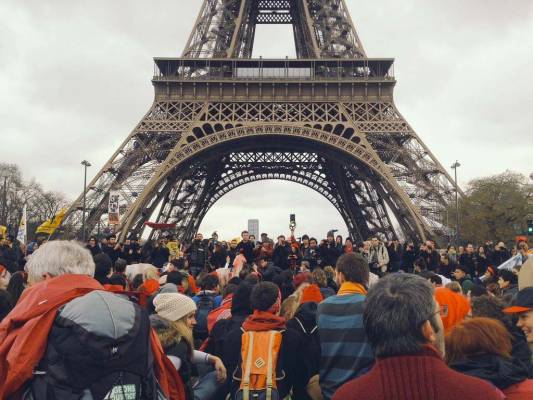




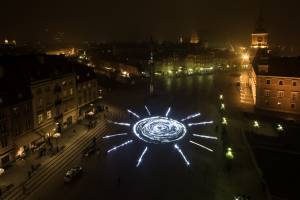

In September, we held our Off & On event in Brooklyn, NY to chart a course for our energy future that moves our economy off fossil fuels, towards one powered 100% by renewable energy sources. Later that month, we held our Power through Paris workshops around the world to train local activists on organizing tools they could use in their community, before they descended on Paris to hold world leaders accountable to the scale of ambition that scientists say we need. There were approximately 300 workshops in 83 countries, with over 6,000 people in attendance.

The Global Climate March on November 28th and 29th brought 785,000 people into the streets in over 2,300 places around the world, and over 10,000 people attended the mobilization in Paris at the end of the talks. Every day, it’s clear our movement is growing and gaining strength — and that’s what gives us hope about actually solving this crisis.
Our social media team amplified indigenous voices and mobilized the public to push for a strong and just agreement during the conference. Our live blog had 115,000 active readers, we reached 27.6 million people on Facebook, and made 269.8 million impressions on Twitter, during just that week and a half of conference negotiations.
Divest/Invest
Fossil Fuel Divestment + Reinvestment
$3,400,000,000,000 (3.4 trillion, USD) Total assets under management that have committed to a level of divestment at end of 2015
6800% Percentage increase in divestment commitments from 2014
$1 Trillion The entire sovereign wealth fund of Norway, divested
In 2015, it became clearer than ever that the divestment movement had grown far beyond its humble origins on the campus of Swarthmore College to become something else entirely: an unprecedented global force for climate action, moving markets and shaping public opinion across the entire world.
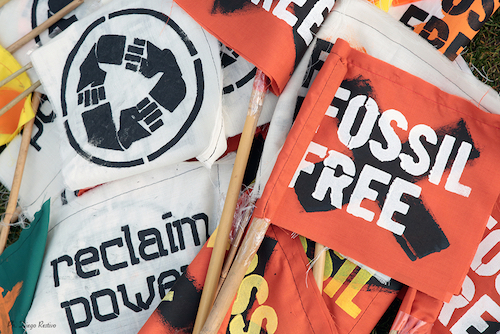
From Oxford University to Columbia, our movement continues to be led by passionate students who will live with the long-term impacts of the climate crisis, and many institutions are taking notice: the two largest pension funds in California divested from coal, as did Norway’s Sovereign Wealth Fund, which together totaled $1.5 trillion dollars in assets.

We generated media and divestment commitments with Global Divestment Day in February 2015. People around the world declared, at over 450 events in 60 countries, that if it’s wrong to wreck the climate, it’s wrong to profit from that wreckage.
Our campaign with The Guardian garnered 300,000 signatures calling for the Bill & Melinda Gates Foundation and the Wellcome Trust to divest. But here’s the number that knocked our socks off: divestment commitments went from $50 billion in 2014 to $3.4 trillion in managed assets (assets managed by an investment manager on behalf of a client) at the end of 2015! Yes that’s trillion with a "t", and counting.
We also helped convene a Reinvestment Network in the United States to drive divested funds away from fossil fuels towards reinvestment in communities on the frontlines of the extractive, exploitative economy. We convened local organizers to create a translocal network of peers building alternative investment structures (think co-ops, solar farms, community-owned businesses, etc.) in climate-impacted communities. In partnership with the divestment student network, we trained dozens of students and fostered relationships between campus divestment leaders and organizations in climate-impacted communities to build power together, driving divestment and advocating for reinvestment in community-owned alternatives to the fossil fuel economy.
Fossil Fuel Industry
Keep it in the Ground
Everywhere the fossil fuel industry looked in 2015, our movement cropped up to deliver the simple message that our climate simply can’t afford the construction of new fossil fuel infrastructure.
Whether it was Energy East in Canada, the Alberta Clipper in Minnesota, or any number of dirty energy projects across the world, our movement has stood up to fight new pipelines, coal developments and fracked gas export facilities that lock our society into developing and paying for fossil fuels for years to come.
Major Victory — 7 November 2015
Keystone XL Pipeline Rejected!

Years of organizing and thousands of actions across North America took the Keystone pipeline from "a done deal" to politically toxic — and set a global precedent for rejecting major fossil fuel infrastructure projects on climate grounds.

Tar Sands
Years of organizing pays off with the rejection of the Keystone XL pipeline, indigenous communities lead the way on fights against new pipelines, and Canada gives Prime Minister Trudeau a Climate Welcome.
2015 was the year President Obama finally rejected the Keystone XL pipeline, specifically citing climate change in his reasoning. That’s entirely the product of our movement’s work over the past four years, holding more than 750 actions and bird-dogging President Obama and Secretary Kerry at over 100 events.
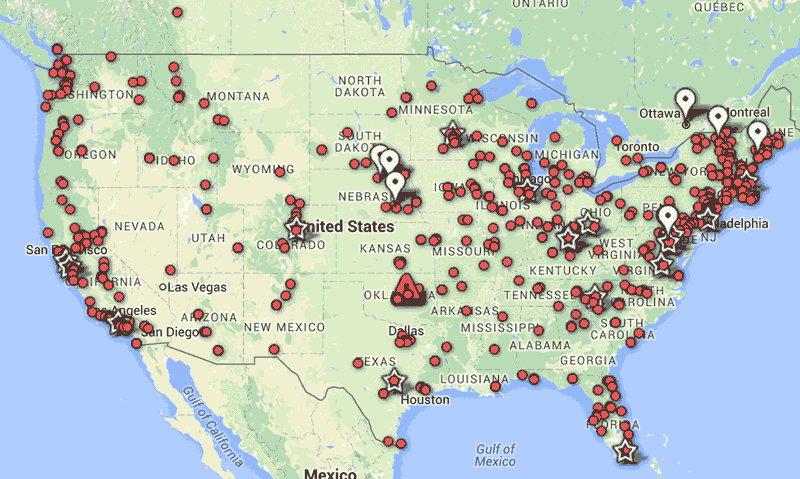
But we knew stopping Keystone wasn’t enough to halt the expansion of the tar sands. So we held a series of Climate Welcome actions for incoming Canadian prime minister Justin Trudeau, where 300 people risked arrest over four days of sit-ins to hold him accountable to his promises on climate change. Led by indigenous elders and women, people gathered from every corner of the country and delivered welcome gifts, including solar panels, for the new Prime Minister.
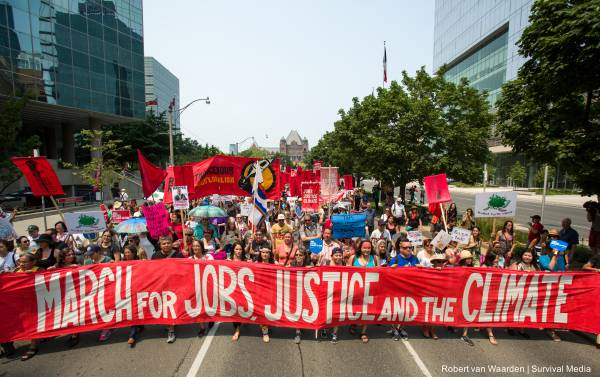
Earlier in the year, our team in Canada worked with partners to organize two massive days of action in July to send the message that We > Tar Sands. These actions were capped by a huge march led by frontline and indigenous communities in Toronto of over 10,000 people demanding real action on jobs, justice, and the climate.
In the upper Midwest of the US, we helped organize 5,000 people for the Midwest Tar Sands Resistance March, which added momentum to the fight to stop the Alberta Clipper pipeline and other proposed Enbridge tar sands projects. That action brought together Native, frontline, and environmental communities from across the Midwest to demonstrate growing tar sands opposition. Since the march, the activists have been targeting statewide decision makers, and building a louder drumbeat for stopping tar sands pipelines throughout the Midwest.
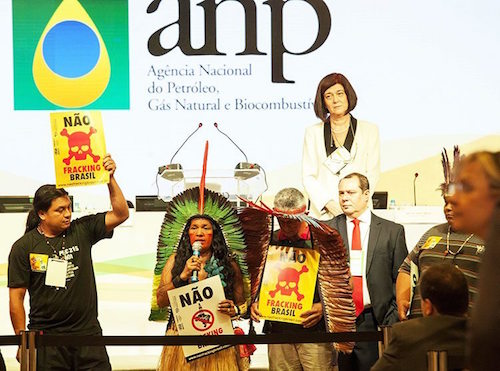
Fracking
Cities and municipalities throughout Brazil ban and put moratoriums on fracking, and California holds the largest anti-fracking demonstration ever in the United States.
In Brazil, the anti-fracking campaign is racking up victories: 51 municipalities have passed fracking bans. The campaign had another big victory in July 2015 when the environment commission of the National House of Representatives approved a five-year moratorium on fracking in National territories. On October 4, 2015, we organized a Day of Action in solidarity with the Brazilian fight against fracking. In total, there were 23 countries and 39 Brazilian cities that symbolically said no to fracking during the day of action. At an oil and gas auction to lease public lands, 350.org supported an action organized by COESUS - No Fracking Brazil Coalition, where indigenous peoples and activists protested against fracking. Of the 266 blocks being auctioned, only 37 were sold.

In the US, we played integral roles in two national fracking coalitions and helped organize the March for Real Climate Leadership, which drew over 8,000 people to a march in Oakland, CA to call for a ban on fracking — the largest anti-fracking march in U.S. history. We’ve also worked with community members to photograph, document, and collect stories in California about how fracking is impacting their lives. We garnered media attention and countered the narrative that fracking is "safe."

Coal
The Philippines ban all new coal power plants in Palawan, Ende Gelände occupies one of the largest coal mines in Europe, and Australia pressures banks to stop funding fossil fuels.
350.org Australia, an independent entity and 350.org partner, drew attention to and built resistance against the Galilee Basin coal development, which would be Australia's largest coal development, and one of the largest in the entire world. Following months of sustained pressure from 350.org Australia’s #RaiseTheHeat campaign, 12 international and two domestic banks — including two of Australia’s four largest banks — have publicly ruled out funding the project due to the financial and environmental risks.

In the Philippines, our team connected with the community in Palawan, who were facing the construction of a coal-fired power plant. In April 2015, 350.org Philippines launched a petition against the power plant and the mine: delivering over 6,000 petitions to the government.
Our team held multiple trainings in June to build the capacity of the local organising team in Palawan and elsewhere in the Philippines, and pressured authorities to not permit the plant. In February 2016, due to grassroots activism, the government ruled that no new coal plants would be built in Palawan!
In Germany, from August 14-16 2015, our team supported a grassroots-led mass action to stop the world’s largest coal diggers in their tracks for a day. The mass action was called Ende Gelände, which translates as “This far, and no further.” Over 1,500 people participated directly in the action, and we estimate that 350–400 people traveled from outside of Germany to take part. Many of the 1,500 people who participated in this epic act of civil disobedience had never done anything like it before.

Training Trainers
Global Organizing and Leadership Development

We have a brand-new Global Training Program to facilitate workshops and trainings around the world and enhance the capacity of our regional organizers to support more activists engaging in bigger and bolder campaigns.
Our new program fosters local leadership and local traditions to yield powerful activism — such as the Pacific Warrior Training Program, which has mobilized hundreds of indigenous activists across many Pacific islands to engage in mass actions confronting the coal industry in Australia.
We worked with Global Greengrants Fund to advise on the distribution of 55 grants to grassroots climate leaders in 34 countries. These grants enabled groups to organize activities and ensure their voices were heard by UN decision makers in Paris, and enabled us to grow our partnership with these groups. We amplified the grantees’ activities with video production and communications.
As we’ve grown our budget over the years, we continue to be aware of partners who have not benefitted in that same way. We can try new things, take risks, and grow our team in a way many of our partners would love to — and without that ability, the movement doesn’t reach its full potential and our impact is constrained. We are passionate about being part of a movement where more partners, particularly grassroots partners, grow and accomplish their highest goals too. To that end, partnerships like the one with Global Greengrants was very important to us, and we will pursue more in the future.
55 Grants
34 Countries
On-the-ground Perspective
Profile: Kreta Kaygang

Partnerships are the bedrock of our work at 350.org. We cannot do this crucial work to fight climate change without hundreds of partner organizations and thousands of volunteer activists around the world. We work closely with our partners on the ground, and support their work to maximize their impact for progress. Here is just one example:
Kreta Kaygang is a representative of APIB (the National Articulation of Indigenous Peoples), he speaks on behalf of the indigenous peoples in Brazil. His father was also a known activist for indigenous peoples' rights who was killed during the indigenous genocide by the military dictatorship.
Now, as fracking threatens the territories and livelihoods of Amazonian indigenous peoples' groups, Kreta is leading the fight of the Kaygang people, aware of this danger and organizing to resist it.
Kreta’s involvement in this struggle began during the workshops organized by 350 Brazil, and partners including COESUS-Coalizão Não Fracking Brasil (No Fracking Brazil Coalition), to explain the risks of fracking. He recalls, “the No Fracking coalition was essential to raise our attention to a matter that was unknown to us before [fracking]; showing us the way to raise our opposition, and helping indigenous peoples to understand better this issue, through workshops. Most Brazilians, not only indigenous peoples, don't know what fracking is, we all should know...”

“The interests of the colossal fossil and mining projects all over Brazil, and the entire planet can no longer be put ahead of those of human and indigenous rights.”
The involvement of Kreta and other indigenous leaders, along with the support from our local partners including the Indigenous Missionary Council (CIMI) and Fundação Cooperlivre Arayara were key to engage the Federal District Attorney and local authorities in legal actions that led to the courts ruling bans on fracking across seven Brazilian states. For Nicole Oliveira, 350.org's Brazil team leader, “it's been a long fight but we are determined to continue; I feel confident to say we are winning and we will defeat the fossil fuel industry.”

Kreta is aware that a future court ruling could overturn this decision, but he has a clear vision for his plight: “We will continue fighting. Let's continue fighting in our countries, but let's also make an international union to collaborate on the struggle against fracking. Let's continue fighting, not only for a Brazil without fracking, but for a better planet for future generations. We indigenous peoples don't fight for today. We fight for the next generations, so everyone must unite to fight for their rights.”
It's thanks to Kreta and people like him — from Brazil to South Africa and from Great Britain to the South Pacific and hundreds of places in between — that we can achieve so much in such a short amount of time.
“The interests of the colossal fossil and mining projects all over Brazil, and the entire planet can no longer be put ahead of those of human and indigenous rights”, Kreta pointed out in a recent op-ed.
350.org worked with Kreta to write this profile and publishes it with his permission. Our heartfelt thanks goes out to Kreta and all our volunteer activists, partners, and supporters all around the world!
Financials
Financial Information
FY15 Expenses: $8,954,000
Campaigns — $7,601,000
- Field Work — $5,298,780
- Communications — $836,110
- Digital — $836,110
Management and General Operations — $1,132,000
Fundraising —$221,000
FY15 Income: $11,338,000
Foundations — $7,795,000
Individuals — $3,368,000
Other Sources — $175,000
In addition to individual donations, 350.org’s work in Fiscal Year 2015 was supported by the following foundations:
- AHS Foundation
- The Alper Foundation
- Angel Fund of Whatcom Community Foundation
- Anne Cox Chambers Foundation
- The Arete Foundation
- Arkay Foundation
- Arntz Family Foundation
- The Beim Foundation
- The Betty Millard Foundation
- The Blum Family Foundation
- The Boston Foundation
- Brenda Richardson Fund of the Baltimore Community Foundation
- The Charles and Kaaren Family Foundation
- Christina Heroy Foundation
- Clif Bar Family Foundation
- Climate Ride
- Climateworks Foundation
- Community Foundation of Louisville
- Compton Foundation
- Crankstart Foundation
- CREDO
- Cultural Vision Fund
- Danem Foundation
- Davis/Dauray Family Fund
- The DeLong Family Trust
- Denison Family Foundation
- The Douglass Family Foundation
- The Dudley Foundation
- Elphaba Fund at the Boston Foundation
- The Emanuel and Anna Weinstein Foundation
- Emmons-Bradlee Family Foundation
- European Climate Foundation
- The Fair Share Fund at the Community Foundation Santa Cruz County
- FThree Foundation
- Fast Tempos & Odd Time Signatures Fund
- Fellows Fund at the Rhode Island Foundation
- Frahn Family Fund of the Silicon Valley Community Foundation
- Franciscan Sisters of Mary
- Frankel Family Foundation
- Franklin Philanthropic Foundation
- Frederick Mulder Foundation
- The Frost Foundation
- The Grace Jones Richardson Trust
- The Gratch Family Fund, Evanston Community Foundation
- Good Hand Foundation
- Gould Family Foundation
- Grantham Foundation for the Protection of the Environment
- Gregg and Cynthia Alex Family Charitable Fund
- Hirshan Family Foundation
- Holzer Family Foundation
- James and Marcene Sonneborn Fund
- The Jelks Family Foundation
- John and Marianne Gerhart Fund of Tides Foundation
- Jonathan C.S. Cox Family Foundation
- The K Foundation
- Kane Family Foundation
- The Kendeda Fund
- KR Foundation
- Lear Family Foundation
- Lenfestey Family Foundation
- The Libra Foundation
- LJTJ Fund
- Lockhart Vaughan Foundation
- Louis and Anne Abrons Foundation
- Louise B. and J. Ashley Cadwell Fund of the Vermont Community Foundation
- The Lumpkin Family Foundation
- The Lutz Fund
- Malcolm Cravens Foundation
- The Mad Rose Foundation
- The Madwoman Project in the Charlottesville Area Community Foundation
- The Marcus R. and Regina M. Magnuson Family Donor Advised Fund of Renaissance Charitable Foundation
- Marisla Foundation
- Marquis George McDonald Foundation
- Mason-Brown Fund at the Boston Foundation
- Mattlin Foundation
- The Mendell Family Fund
- The Mennonite Foundation
- Mertz Gilmore Foundation
- The Michels Family Foundation
- Michl Fund of the Community Foundation of Boulder County
- Mize Family Foundation
- Morse Hill Trust
- The Namaste Foundation
- New Belgium Family Foundation
- New Venture Fund
- The New York Community Trust
- Oak Foundation
- The Oregon Community Foundation
- The Overbrook Foundation
- Park Foundation
- Patagonia
- Paul and Edith Babson Foundation
- Phalarope Fund of Community Foundation Sonoma County
- The Pill Maharam Family Fund
- Pisces Foundation
- Putnam Foundation
- Razoo Foundation
- The Reis Foundation
- Richard and Rachel Fund, New Mexico Community Foundation
- Robert Scripps Family Foundation
- Robert Sterling Clark Foundation
- Robinhood Cove Fund of the Essex County Community Foundation
- Rockefeller Brothers Fund
- Rose Foundation for Communities and the Environment
- RSF Social Finance as recommended by Jennifer Ladd
- S.B. Foundation
- The Sainsbury Family Charitable Trusts
- Samuel and Elizabeth Smith Fund
- Schaar & Whelpton Foundation
- Schaffner Family Foundation
- Scherman Foundation
- Schlingerman-Christensen Family Foundation
- The Seattle Foundation
- Second Anonymous Fund, Santa Fe Community Foundation
- Seth MacFarlane Foundation
- Shlenker Block Fund at the Houston Jewish Community Foundation
- The Shifting Foundation
- The Shimkin Foundation
- The Silicon Valley Community Foundation
- Sitxty-Nine Roses Charitable Foundation at the Boston Foundation
- South Mountain Company Foundation
- Stanley Family Fund of the Community Foundation of New Jersey
- The Stanny Foundation
- The Streisand Foundation
- Stuart and Joanna Brown Charitable Fund
- Sudhanshu, Lori & Anand Family Fund of the Silicon Valley Community Foundation
- Szekely Family Foundation
- ThreeBees Fund at The Boston Foundation
- Tides Foundation
- The Tilia Fund
- Thanksgiving Fund
- TomKat Charitable Trust
- Tortuga Foundation
- Treeline Foundation
- V. Kann Rasmussen Foundation
- Van Strum Foundation
- Wallace Global Fund
- The White Cedar Fund of Tides Foundation
- William and Linda Green Charitable Fund
- The William B. Wiener, Jr. Foundation
- William C. Bullitt Foundation
- The Winslow Foundation
- Yellow Chair Foundation
- Zaitlin-Nienberg Family Fund
